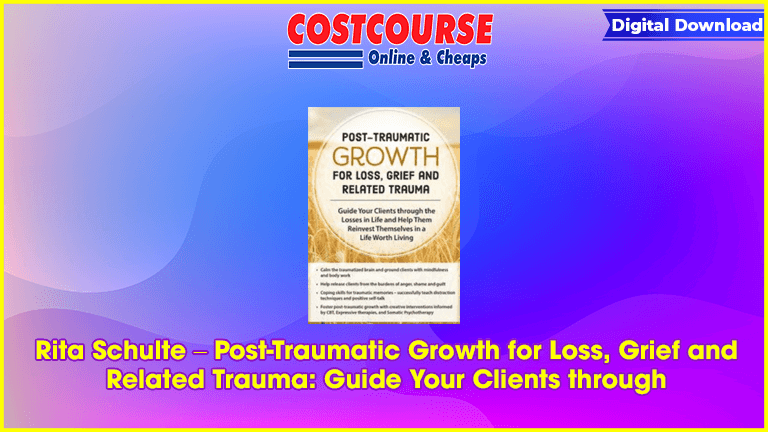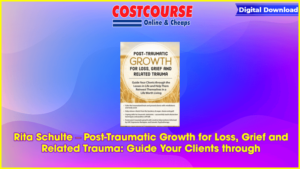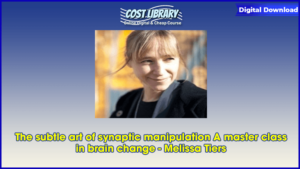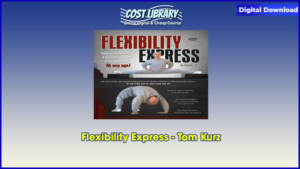Description
Calm the traumatized brain and ground clients with mindfulness and body work
Help release clients from the burdens of anger, shame and guilt
Rita Schulte – Post-Traumatic Growth for Loss, Grief and Related Trauma: Guide Your Clients through the Losses in Life and Help Them Reinvest Themselves in a Life Worth Living
Coping skills for traumatic memories – successfully teach distraction techniques and positive self-talk
Foster post-traumatic growth with creative interventions informed by CBT, Expressive therapies, and Somatic Psychotherapy
Your clients are suffering, victims of the life-shattering effects of loss and trauma. Many have lost loved ones to disease while others lives’ have been devastated by the trauma of abuse and suicide. Still more face the agony of abstract losses like shattered dreams, unmet expectations, and the losses of love, trust, faith, and hope.
Stories of grief and loss aren’t happy ones. They are not easy to tell – so your clients don’t. They bottle them up, push them down, and close-up shop. And their pain sits. Sometimes for decades. But you know how your clients respond to traumatic events determines what happens to their hearts — that part of the journey of recovering from loss is finding meaning and purpose. As clinicians, we long to connect our clients with the greater appreciation for life, improved relationships, and personal development that post-traumatic growth provides for those who find it.
But we can’t help those suffering from loss, grief and trauma move their story forward unless we challenge them to step out and take risks. It’s critical to tap into the client’s potential for resiliency, open them to new possibilities, and compassionately walk with them along the path to post-traumatic growth.
Rita Schulte is a licensed professional counselor, radio host, author, and suicide loss survivor. Rita lost her beloved husband to suicide in 2013 and approaches post-traumatic growth from the unique position of a counselor with lived experience. Through her own journey of loss and grief she has come to understand the targeted treatments and specific supportive measures needed to cope and transition to a life after loss as only someone who’s travelled the road to post-traumatic growth can.
Transform the lives of your clients with:
Effective methods to calm the overactive brain and improve affect regulation.
The “Shattered Vase†and other imaginative exercises that open clients to new possibilities.
Practical tools to manage traumatic memories and address the toxic emotions of anger, guilt and shame.
Creative expressive and somatic interventions using art, writing, and remembered resources to facilitate post-traumatic growth.
Watch Rita for this candid recording. She’ll show you how to honor your clients pain while gently planting the seeds of post-traumatic growth.
Help your clients reclaim their hearts after loss and reinvest themselves in a life worth living!
Handouts
Manual 053485 (2.22 MB) 60 Pages Available after Purchase
Outline
Face Loss, Grief and Trauma with a Strengths-Based Approach
Crisis of belief and existential shattering
Meaning making and the importance of “whyâ€
Grief vs. complicated grief
Abstract losses and the Ball of Grief
Tapping into resiliency
Core competencies and key principles
Identify your clients’ strengths
Current evidence on strengths-based approaches
Calm the Overactive Brain of Your Client
The neurobiology of the traumatized brain
Mindfulness and the art of noticing
Containment skills
Grounding exercises
Affect regulation
Breathing and soothing techniques
Tools for Managing Anger, Guilt, Shame and Traumatic Memories
Dealing with anger
The REACH model of forgiveness
Certificates of debt
The power of surrender
Address guilt and shame
How shame relates to trauma and loss
Faulty beliefs and getting stuck
Cognitive restructuring
Manage traumatic memories with CBT coping skills
Distraction techniques
Positive self-talk
Move Clients Toward Post-Traumatic Growth With Interventions Informed by Cognitive Behavioral Therapy (CBT)
Shattered Vase Exercise – plant the seeds of possibility
Creating narratives
Letter writing
Positive remembering and repositioning
Reframe the meaning
Expressive and Somatic Therapeutic Interventions To Cultivate Post-Traumatic Growth
Integrate left and right hemispheres
Art therapy
Writing to heal
Access and reclaim compassion
Somatic resourcing
Remembered resources
Assess clients self-talk
Reinvest in a Life Worth Living: Rekindle the Desires of the Heart
The PIE of life – brainstorm possibilities of growth
Cultivate social connection and re-engagement
Support and grief groups
Toxic people
Working with families impacted by loss
Choice and perspective
Foster gratitude and a spirit of contentment after loss
Measurements of Post-Traumatic Growth
Faculty
Rita Schulte, LPC
Rita A. Schulte, LPC, specializes in the treatment of depression and suicidality, grief and loss issues, anxiety, relationship problems, and eating disorders. Rita’s beloved husband died of suicide in 2013, and she speaks candidly about her loss in the hope of helping others to heal.
The author of Think This Not That: Eliminate Toxic Thinking and Rewire Your Brain (Leafwood) and Shattered: Finding Hope and Healing through the Losses of Life (Leafwood), Rita also writes for numerous publications and blogs. Her articles have appeared in Counseling Today Magazine, Thriving Family, and LifeHack.org.
Rita is also the creator and host of Heartline Radio where she talks with counselors, authors and everyday people looking for advice on moving through the difficulties of life. Rita earned a B.S. degree in psychology and a master’s degree in counseling from Liberty University in Lynchburg, Virginia.
Speaker Disclosure:
Financial: Rita Schulte is in private practice. She receives a speaking honorarium from PESI, Inc.
Non-financial: Rita Schulte is a member of the American Counseling Association; and the National Board of Certified Counselors.
Proof Content








